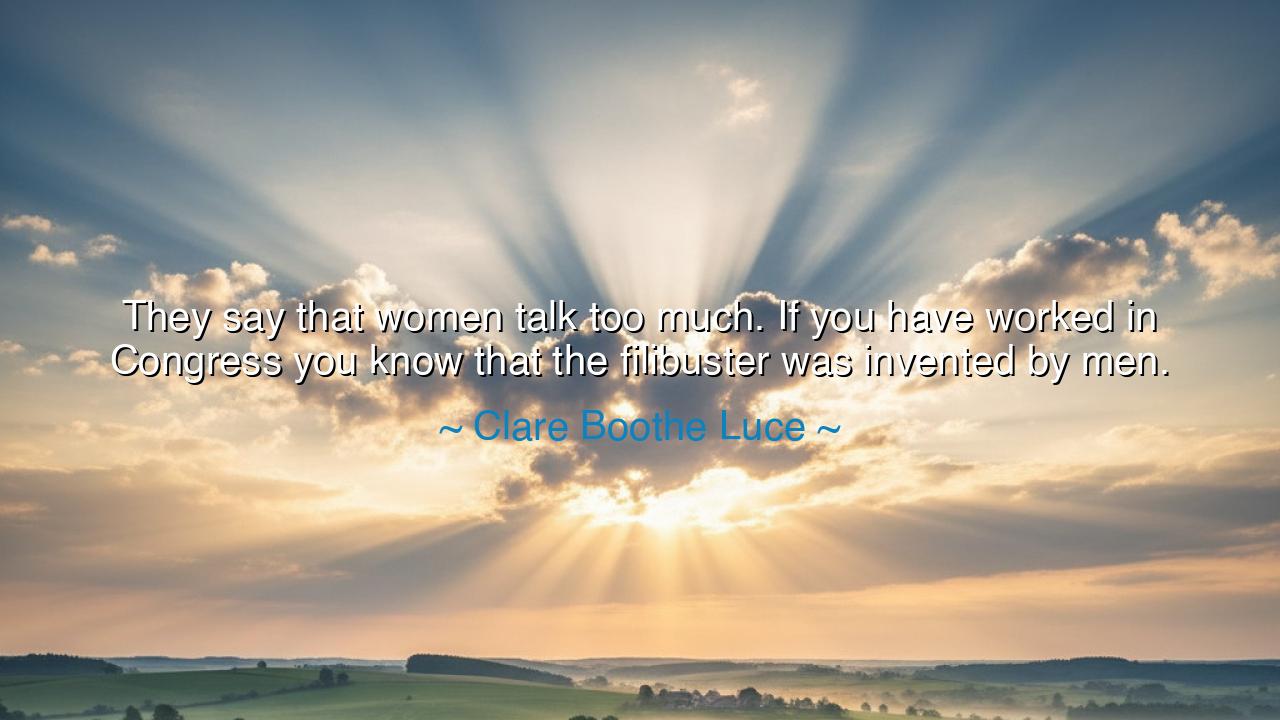
They say that women talk too much. If you have worked in
They say that women talk too much. If you have worked in Congress you know that the filibuster was invented by men.






When Clare Boothe Luce declared, “They say that women talk too much. If you have worked in Congress you know that the filibuster was invented by men,” she struck with wit and wisdom against the ancient prejudices that belittle women’s voices. Her words unmask the hypocrisy of a world that mocks women for speech, yet exalts the endless words of men when wielded as a weapon of power. It is both satire and truth, a reminder that what is condemned in one gender is often celebrated in the other.
The ancients knew well the power of speech. In the assemblies of Athens and the senates of Rome, orators thundered for hours, swaying the destinies of nations with the sheer force of their voices. These were the true architects of the filibuster—men who prolonged debate not for clarity, but for victory. Yet when women dared to speak at length, they were branded as gossips, their words dismissed as idle chatter. Luce’s statement turns this ancient double standard upon its head, revealing it for what it is: injustice cloaked as tradition.
History offers us vivid examples. In 1917, Senator Robert La Follette of Wisconsin spoke for over three hours to stall legislation he opposed, a maneuver celebrated as courage and conviction. Yet in the same era, suffragists who filled the streets with speeches demanding the right to vote were derided as shrill and excessive. The very act of talking too much became either noble or shameful, depending not on the quality of words, but on the gender of the speaker.
Luce’s wit is sharpened by her own experience. As one of the first women to serve in the United States Congress, she witnessed firsthand the torrent of endless speeches delivered by her male colleagues. In pointing to the filibuster, she draws from life, exposing the irony that the longest and most obstructive words of all were born from men, not women. Her statement thus becomes both a defense of women’s right to speak and an indictment of the false charges laid against them.
Therefore, let her words be preserved as a lesson to the generations: speech is not a sin when wielded by women, nor is silence a crown upon men. Let us judge words by their truth and purpose, not by the lips from which they fall. For the power of speech belongs to all, and when tempered with justice, it can be the flame that illumines a nation, rather than the shadow that mocks its daughters.






LDPham Quynh Linh Dan
Clare Boothe Luce's statement is a clever critique of how society views women’s speech. The filibuster is a male invention that involves excessive talking for strategic purposes, yet women are still labeled as talkative or gossipy when they speak out. Why are men’s long-winded speeches in politics seen as necessary, but women’s voices often minimized or dismissed? This raises questions about how we value and interpret public speaking based on gender.
PNTan Phuc Nguyen
I love how this quote flips the stereotype of women talking too much on its head. Luce uses the filibuster, a powerful and disruptive political tactic historically used by men, to make a strong point about how women’s voices are often criticized. This really makes me question how many other behaviors, when done by men, are praised or accepted, but when done by women, are seen as negative. Why is that disparity so ingrained in our culture?
ANAn Nguyen
Luce’s quote is a witty and pointed commentary on how certain behaviors, like excessive talking, are often attributed to women while similar tactics by men are overlooked or normalized. The filibuster is a perfect example of how men have historically used speech for power. Why do we perpetuate these double standards, where men’s long speeches are strategic, but women’s are seen as excessive? What does this tell us about gender biases in political and social spaces?
NNChinh Nguyen nhu
This quote humorously challenges the stereotype that women talk too much. Luce’s comparison of the filibuster, a male-driven political tactic, to the idea of women being overly talkative, highlights the irony in how certain behaviors are attributed to gender. It makes me think about how society often labels women for qualities that can be found in all people, regardless of gender. What does this say about how we view men and women’s voices in public discourse?